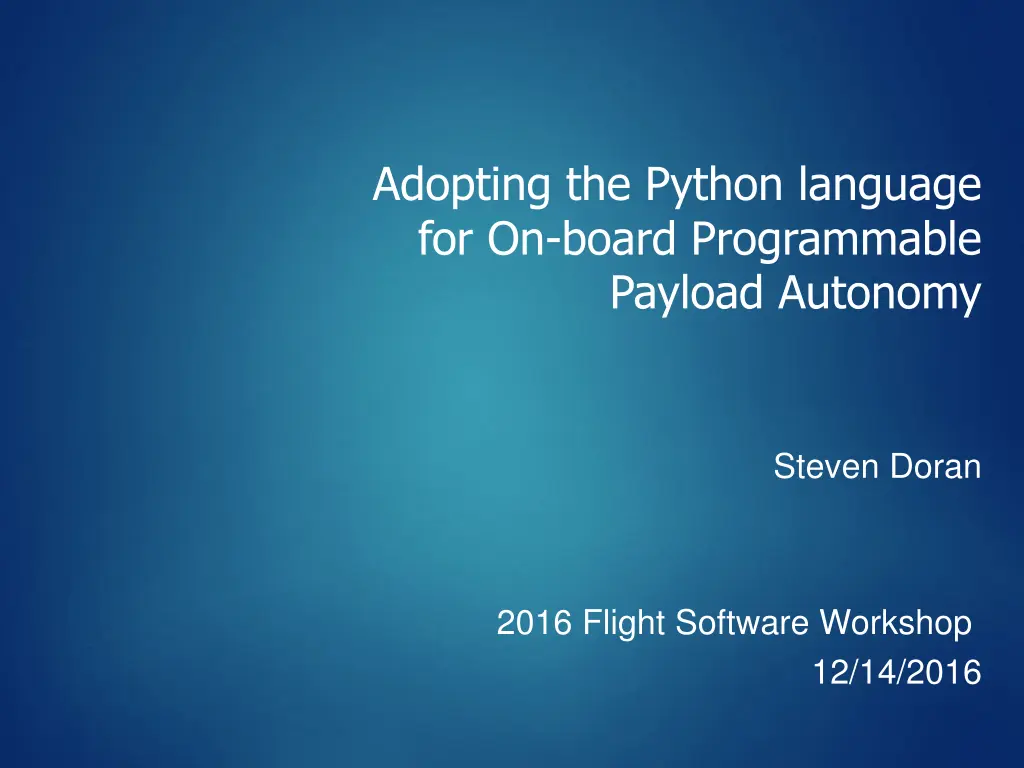
Adopting Python for On-board Programmable Payload Autonomy
Explore how Python is being adopted for on-board programmable payload autonomy in the context of legacy systems and the replacement of the Stored Program Interpreter. Discover the feasibility of using Python as a replacement candidate through a prototype study, leveraging its high-level programming capabilities and seamless integration with existing systems.
Uploaded on | 0 Views
Download Presentation

Please find below an Image/Link to download the presentation.
The content on the website is provided AS IS for your information and personal use only. It may not be sold, licensed, or shared on other websites without obtaining consent from the author. If you encounter any issues during the download, it is possible that the publisher has removed the file from their server.
You are allowed to download the files provided on this website for personal or commercial use, subject to the condition that they are used lawfully. All files are the property of their respective owners.
The content on the website is provided AS IS for your information and personal use only. It may not be sold, licensed, or shared on other websites without obtaining consent from the author.
E N D
Presentation Transcript
Adopting the Python language for On-board Programmable Payload Autonomy Steven Doran 2016 Flight Software Workshop 12/14/2016
Introduction 2 On legacy systems Northrop Grumman (NGC) Azusa is task to maintain an autonomous commanding capability called Stored Programs Stored Programs are pre-programmed sequences of executable statements stored as database items onboard the payload Provides pre-programmed delivery of commands to the Flight Software (FSW) Includes either Time or Conditional statements for execution Written in a Non-NGC Proprietary scripting language Requires training to learn the Stored Program Interpreter functionality and language For future payloads, an NGC in-house ability for Stored Program functionality is being sought
Stored Program Flow 3 Upload from Ground Find and Store Load Execute Unload Complete (Success / Fail)
Replacement Candidate Requirements 4 An informal study was launched to find a replacement candidate for the legacy Stored Program Interpreter Replacement Candidate Requirements Adopts a common high high-level programming language Requires no specialized training and eliminating a niche engineering skill Full use of Interpreter without restrictions Core Functionality Conditional Statements Delay Statements Read Telemetry Monitors in Real-Time Send FSW Commands (From Script) Python Satisfies all Requirements so a Prototype Study was initiated to determine Feasibility
Python Overview 5 Python is a high-level programming language Interpreted (vs. compiled) Open Source Readable Syntax Modular Extremely popular with wide use adoption
Python / C++ API 6 Python/C API allows to embed Python source code into a C/C++ Application Built-in Python Interpreter Reads either a external file or String containing one or more Python statements #include <Python.h> int main (){ Py_Initialize(); PyRun_SimpleString("print Hello World\n"); Py_Finalize(); return 0; }
Python / C++ API Commands* 7 Py_SetProgramName(char *name) Sets Program name (default is Python) Py_Initialize() Initialize the Python Interpreter PyRun_SimpleString(const char *command, PyCompilerFlags *flags) Runs a Python statement PyRun_SimpleFile(FILE *fp, const char *filename) Runs a Python file Py_Clear() Removes the internal reference (Python Objects) to the Python Module Py_Finalize() Removes all memory allocations and closes the Python Interpreter * Refer to Python/C API Reference Manual
Python / C++ Interconnectivity (Memory Management) 8 The C/C++ Python Interpreter involves a private heap containing all Python objects and data structures Managed by the Python memory manager Interfaces with the OS to ensure enough memory space is allocated for the embedded Python Program Area for concern for Statically-allocated FSW applications Not a show stopper Inefficient data transfers between C Potential issue w/ conditional statements within Stored Program where telemetry values are required One of the focuses of Prototype Demonstration Allows for Dynamic allocation of memory (malloc, realloc, free) Functionality will be prohibited on Stored Programs Not required and a reliability issue Python
Python / C++ Interconnectivity (Exception Handling) 9 All functions in the Python/C API can raise exceptions If an exception occurs the object being referenced is deleted and an error flag is set Python try ... except statement Improved capability than the Legacy Stored Program interpreter
Python Stored Program Constraints 10 Python Stored Programs must be contained in a Python try ... except Exception Block Stored Programs cannot use the Python / C++ API Functionality Preserve FSW deterministic behavior Complex to debug No requirement to perform multi-threaded Stored Programs Only one instance of a Python Stored Program can execute at a time Matches Legacy System Python Stored Programs only have reference memory allocations to the FSW memory space Preserve FSW data integrity Python Stored Programs are a maximum size Constrains the maximum API s private heap space allocation Prototype testing to determine maximum size
Python Stored Program Constraints (cont.) 11 Python Stored Programs cannot launch another Stored Program This is done w/ the legacy system due to the legacy systems Stored Program size constraint
Python Stored Program (Containers) 12 When a Python Stored Program is initiated, it is contained in its own unique thread that is removed once Stored Program execution completes The Python Stored Program s memory access is limited to an allocated section of memory to prevent impacts to overall system Python Interpreter is closed at the end of the Stored Program execution and allocated heap space cleared Goal is to Prevent Stored Program Error from Propagating to The Flight Software
Python Stored Program (Containers) (cont.) 13 2 3 1 Scratchpad Stored Program Thread Launched Memory Python Execute Scheduler CMD Stored Program Completes 5 Thread Removed From Scheduler 4 Stored Program Thread Killed
Commanding and Telemetry 14 Python Stored Programs read FSW telemetry monitor states by a reference table in its assigned Memory scratchpad Scratchpad Memory Python Execute TLM Monitor Ref Table Python Stored Programs send FSW commands using command FIFO in its assigned Memory scratchpad CMD Queue Fight Software (FSW) Command Manager Telemetry Manager
Timing 15 Python Stored Programs are required to use the System Time for command processing Scratchpad Memory Python Execute System Time Python Stored Programs read a System Clock reference register in its assigned Memory scratchpad Fight Software (FSW) System Manager
Python Stored Program (Off-Nominal Processing) 16 The Flight Software monitors the execution of the Python Stored Program If required, the Flight Software can abort the Python Stored Program Calls the Py_Clear() and Py_Finalize() API calls to clear heap space and close the Python interpreter Kills the Stored Program thread
Demonstration Overview 17 A experimental FSW application is commanded to launch a small Python Stored Program The Python Stored Program contains a conditional statement if a telemetry monitor is True/False Command processed is based on True/False condition Telemetry monitor will be updated based on Stored Program processing Demonstration Tests Core Functionality of Stored Programs
Prototype Demonstration Environment 18 Test Station Development Workstation (FSW / Stored Programs) (Commanding / Telemetry) ethernet Command to launch Stored Program sent from test station Communication via ethernet
Current Status / Future Work 19 Higher Priority tasks prevented completion of the demonstration this year Prototype testing to date shows Python Stored Program scripting is feasible and easy to implement Plan is to complete the demonstration next year and use more complex Stored Programs
References 21 Python/C API Reference Manual www.python.org
Abstract 22 Abstract: This presentation describes the development and implementation of adopting the Python programming language for programmable autonomous commanding and mission processing for future spaced-based payloads. The presentation outlines the many advantages of adopting the Python programming language of autonomous commanding. The presentation also discusses the incorporation of the Python interpreter into the future On-orbit Payload (OP) Flight Software, including the implementation of the container strategy to prevent a processing error within the uploaded Python script from propagating to the OP Flight Software s State of Health (SOH) and mission processing.






















